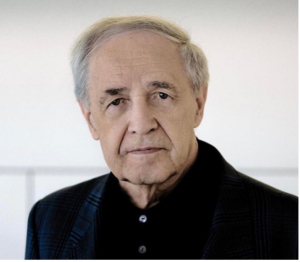#200– May 22, 2023

https://www.youtube.com/watch?v=NvCfjTBUOZA
Initiale, by French composer, conductor and teacher Pierre Boulez is our Composition of the Week.
Initiale is a short, only 5 minutes, rarely performed piece by Pierre Boulez that he composed for the Houston Symphony Orchestra, in 1987. The instruments, two trombones, two horns and two trumpets, are symmetrically distributed around the tuba, allowing for echo and spatialization effects that the composer of “Répons” likes to consider.
Its first performance took place in Houston, USA, on November 11, 1987.
A new version of the work followed in 2010. Initiale for brass and percussion is in principle the same as Fanfare, composed for the 80th birthday of conductor Georg Solti in a 1992, and is a short, virtuoso fanfare.
The work is available on rental at Universal Edition.
“Initiale, scored for a brass ensemble, begins with the energy and the gleam of a fanfare. But as its helixes of notes eddy and swirl, a sense of timelessness and depth engulfs us. Like many of Boulez’s most successful compositions Initiale combines traditional instrumentation and modern sound. Some critics find irony here since Boulez was probably the most important single figure in fostering electronic and digital media in classical music yet was more successful in composing for orchestral instruments. But we can chalk this up to his insistence on being true to one’s own compositional voice. In listening to any Boulez composition, it is useful to focus on textures and contours. In Initiale, the textures have a radiant aura, and the contours seem to churn. The result is almost hypnotic. As the phrases spiral outward, the repetition of certain pitches gives them a sort of gravitational pull that orients us in musical space. Eventually a shimmering pattern of motivic statement takes shape. Is Boulez inviting us to hear Initiale as a fanfare? Its all brass scoring and its title may provide a clue.” (Program notes by Michael Clive in “Contemporary Classical“)
Pierre Boulez was a composer, conductor, thinker, a motor of international musical life, an emblematic figure in post-war European, indeed, world culture.
He was a living classic. Ever since the 1950s, composers around the world followed with curiosity what he was writing, to see if they could adapt his ideas in their own music or to reject them in their search for an idiom, they could call their own. In 1957, György Kurtág arrived in Paris with the goal to compose something he could show to Boulez (in the end, he left without a work worthy of being presented). The music the French composer has written ever since the late 1940s was a conscious act of rebellion against tradition as represented by Schönberg or Stravinsky but also his teacher, Messiaen, whose influence has nevertheless left its mark on Boulez’s music.
In his compositions but also in his writings, Boulez was initially an angry and rebellious young man (see his scathing obituary “Schönberg est mort”). With the passage of time as he became an established figure, with France inviting him back to found IRCAM and the Ensemble Intercontemporain and his career as a conductor also taking off, there has probably been less to rebel against, and Boulez has mellowed and broadened his horizons to conduct a wide range of repertoire including Bruckner and Mahler.
Boulez also was a highly influential teacher. In Lucerne he passed on his immense knowledge to fledgling conductors at the Festival Academy.
He died on January 5, 2016, in Baden-Baden, Germany. (Biography notes by Universal Edition)


